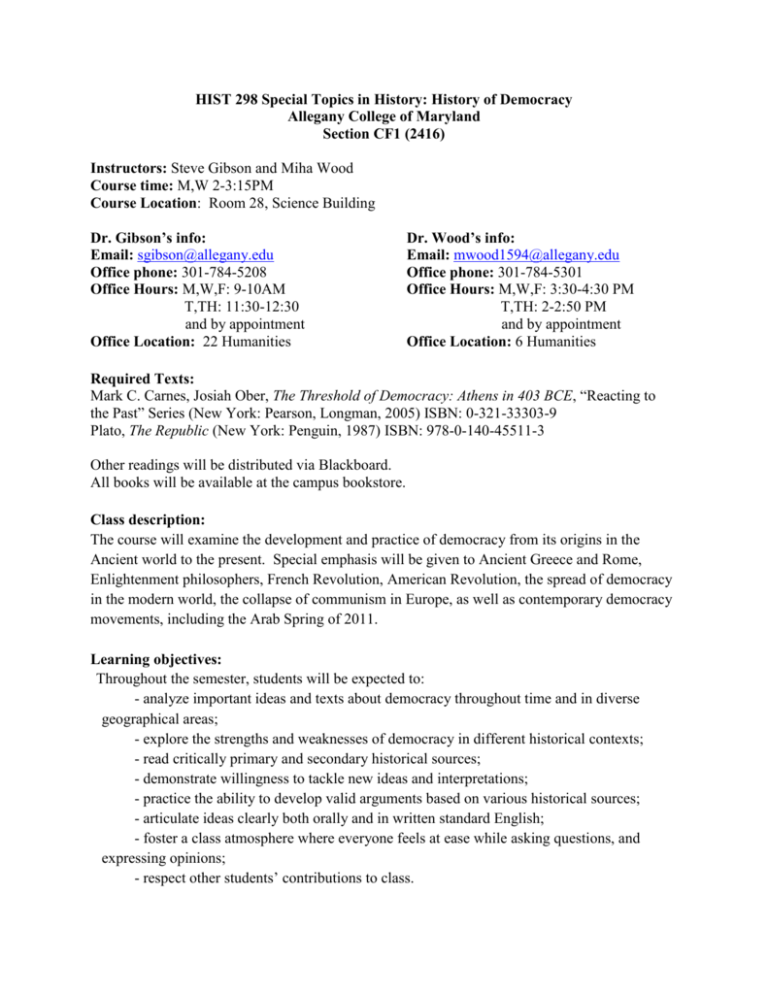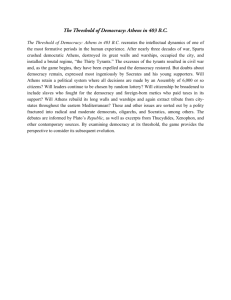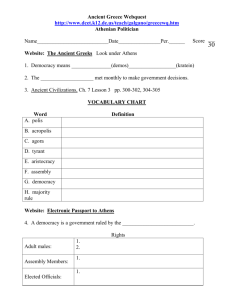
HIST 298 Special Topics in History: History of Democracy
Allegany College of Maryland
Section CF1 (2416)
Instructors: Steve Gibson and Miha Wood
Course time: M,W 2-3:15PM
Course Location: Room 28, Science Building
Dr. Gibson’s info:
Email: sgibson@allegany.edu
Office phone: 301-784-5208
Office Hours: M,W,F: 9-10AM
T,TH: 11:30-12:30
and by appointment
Office Location: 22 Humanities
Dr. Wood’s info:
Email: mwood1594@allegany.edu
Office phone: 301-784-5301
Office Hours: M,W,F: 3:30-4:30 PM
T,TH: 2-2:50 PM
and by appointment
Office Location: 6 Humanities
Required Texts:
Mark C. Carnes, Josiah Ober, The Threshold of Democracy: Athens in 403 BCE, “Reacting to
the Past” Series (New York: Pearson, Longman, 2005) ISBN: 0-321-33303-9
Plato, The Republic (New York: Penguin, 1987) ISBN: 978-0-140-45511-3
Other readings will be distributed via Blackboard.
All books will be available at the campus bookstore.
Class description:
The course will examine the development and practice of democracy from its origins in the
Ancient world to the present. Special emphasis will be given to Ancient Greece and Rome,
Enlightenment philosophers, French Revolution, American Revolution, the spread of democracy
in the modern world, the collapse of communism in Europe, as well as contemporary democracy
movements, including the Arab Spring of 2011.
Learning objectives:
Throughout the semester, students will be expected to:
- analyze important ideas and texts about democracy throughout time and in diverse
geographical areas;
- explore the strengths and weaknesses of democracy in different historical contexts;
- read critically primary and secondary historical sources;
- demonstrate willingness to tackle new ideas and interpretations;
- practice the ability to develop valid arguments based on various historical sources;
- articulate ideas clearly both orally and in written standard English;
- foster a class atmosphere where everyone feels at ease while asking questions, and
expressing opinions;
- respect other students’ contributions to class.
Methods of Instruction:
This class will combine lectures, class discussion, small group discussion, in-class presentations, and
hands-on experience.
Assignments:
Reflection Paper on a Public Meeting: Students will be required to attend a public meeting and
reflect on how it functioned as an example of democratic application. Suggested meetings are
city council, county commissioners, or school board meetings.
Two Short Papers (Reacting to the Past Game): These papers are built into the Athenian
Democracy unit and are explained in the book.
Paper Presentation on Democracy Today: Students will be required to research an ongoing
democracy movement. The paper will be presented to the class during the last two weeks of the
semester.
Talking Points (Mini reflection papers based on readings): For each day’s reading, students will
bring to class specific notes to be used as the basis of classroom discussion. The talking points
will be collected at the end of class.
Class Participation: Class Participation will be a central part of the class.
Handouts will be provided to explain each of these assignments in greater detail.
Student Assessment
Final grades will be determined according to the following scale:
Grade Distribution:
Reflection Paper on Public Meeting: 10%
Game Papers: 20%
Talking Points: 30%
Paper Presentation: 20%
Class Participation: 20%
100-90 = A
89-80 = B
79-70 = C
69-60 = D
Below 60=F
Student Learning and Instructor’s Role:
We expect that students will enter the classroom with an open mind and a desire to learn. In
turn, we will work to make the classroom as conducive to learning as possible. Respect for all is
mandatory. The classroom will be a location of sharing ideas, thoughts, questions, and
information. This requires all involved to be tolerant of differing opinions. Questions are
encouraged. We will all need to think critically about democracy, society and history.
However, it is important to note that critical thinking does not mean derisiveness, negativism, or
relativism. To be a critic does not mean that everything is viewed in a negative light, or is found
lacking. A critic can discover the positive as well as the negative. In the same way, different
opinions in the classroom are to be expected and accepted.
Class Participation:
In-class participation is an essential aspect of this class. IF you are not in class, then you cannot
participate in the discussions, and will therefore miss a significant segment of the class.
Participation in class discussions and presentations is required of all students. In order for the
classroom to be an open arena for discussion and learning, it will be necessary for the students to
freely share ideas, thoughts, and questions. It is important that students feel free to express their
thoughts. Therefore, certain guidelines do need to be established. First and most importantly,
students will respect each other. When one student is talking, interruptions will not be tolerated.
Also, any behavior that ridicules other students will not be tolerated. Disagreements and
difference of opinion are expected, but it is important to remain respectful of each other.
If a student knows that they will be missing class due to an emergency or illness, please contact
us as far in advance as possible. The sooner you contact us, the easier it will be for us to
negotiate appropriate make-up assignments. If you have to miss multiple classes due to illness or
family emergency please talk to us about make-up work. We are willing to try to negotiate
something, IF YOU approach us.
It is important to note that not all work in the classroom can be made-up. In class discussions,
small group projects, presentations, and lectures can not be repeated. Therefore, it is important
not to miss class.
Extra Credit:
Extra Credit is not built into the class schedule. It is possible that opportunities for extra-credit
will arise during the semester. When it does, all students will be notified.
Deadlines:
Deadlines are firm. Late work will not be accepted. If you have any problems with assignments
please let us know as far in advance as possible.
Student Conduct:
This class is designed for the students to be an active part of the learning experience. Therefore,
it is important for students to arrive on time and participate while the class is in session. During
presentations, listening to the presenter is an important part of class participation. During class
discussions it is equally important that students alternate listening and talking in a polite and
productive manner. Differences of opinion will occur, but it is important that a free exchange of
ideas occur. However, a free exchange does not allow for intimidating or disrespectful language
or behavior.
Plagiarism:
When consulting printed or online sources, bear in mind that any ideas or materials that you
incorporate into your work must be properly cited, even when you are not quoting them directly.
If you have questions about appropriate methods of citation, consult us. Plagiarism, dishonesty,
cheating, and other violations of academic integrity will provide grounds for disciplinary action
and will result in failure for the course.
Inclement Weather:
Weather-related college closings are announced on the college website and on regional radio and
television stations. Students who drive to class are encouraged to consider safety first in making
attendance decisions, and to notify the instructor if they judge conditions to be unsafe to drive
when classes have not been cancelled.
Changes to this syllabus:
The schedule of this course is tentative and it may change throughout the semester. If this will
be the case, we will promptly inform you of any changes.
Schedule of classes:
Day 1
1/23
Course Introduction; How to Read Primary Sources
Week 1
1/25
The Enlightenment and the Intellectual Roots of Modern Democracy
Readings:
Jean Jacques Rousseau, The Social Contract
John Locke, Second Treatise on Government
Thomas Hobbes, Leviathan
Week 2
1/30-2/1
Democracy in Action: The Atlantic Revolutions
Readings:
The English Bill of Rights, 1689
Thomas Jefferson, The Declaration of Independence, 1776
Thomas Jefferson, Notes on the State of Virginia
Thomas Paine, Common Sense
The Declaration of the Rights of Man and of the Citizen, 1789
Olympe de Gouges, Declaration of the Rights of Woman, 1791
Week 3
2/6-2/8
Ideas of Democracy in the Political Ideologies of the Long Nineteenth Century
Readings:
Edmund Burke, Reflections on the Revolution in France
John Stuart Mill, On Liberty
Karl Marx and Frederick Engels, The Communist Manifesto
Mary Wollstonecraft, Vindication of the Rights of Women
Week 4
2/13-2/15
Transitioning to the 20th Century: Women’s Suffrage and Blacks’ Rights
&
The Rise and Fall of Democracy in the 20th Century: The Russian Revolution
Readings:
Mississippi Black Code
Seneca Falls Declaration
Jane Adams, Why Women Should Vote
Frederick Douglass, What the Black Man Wants
Frederick Douglass, What to the Slave is the Fourth of July
Week 5
2/20-2/22
The Rise and Fall of Democracy in the 20th Century : Fascism, Totalitarianism
Readings:
Vladimir I. Lenin, The State and Revolution
H.G. Wells, Interview with Stalin
Solzhenitsyn, The Stalinist Gulag
Benito Mussolini, Mussolini and Fascism
Adolf Hitler, Mein Kampf
The Nuremberg Laws on Citizenship and Race
Law for the Protection of German Blood and Honor
Week 6
2/27-2/29
The Rise and Fall of Democracy in the 20th Century: The Fall of Communism
Readings:
The Demand of Solidarity
Mikhail Gorbacev, Perestroika
Vaclav Havel, New Year’s Address, 1990
Public Meeting Paper Due 2/29
Week 7
3/5-3/7
Extensions of Democracy in the 20th Century: The Protests of the 1960s
Readings:
The Port Huron Statement
Voting Literacy Test
The Sharon Statement
SPRING BREAK 3/12-3/17
Week 8
3/19-3/21
Extensions of Democracy in the 20th Century: Case Studies in Race and Class
Relations: South Africa and the USA
Readings:
Wagner Act
1937 Fansteel Sit-Down Strike
Nelson Mandela, The Rivonia Trial Speech to the Court
Nelson Mandela, Presidential Inauguration Address, May 10, 1994
Week 9
3/26-3/28
Reacting to the Past Game: The Threshold of Democracy – Athens, 403 BCE
Introduction and Historical Background of the Period
Readings:
Textbook: The Threshold of Democracy: Athens in 403 BCE
Plato, The Republic (excerpts)
Week 10
4/2-4/4
Reacting to the Past Game: The Threshold of Democracy – Athens, 403 BCE
Overview of Plato’s Republic (Books I-III, V-VII) and First Assembly Meeting:
Reconciliation Agreement
Readings:
Textbook: The Threshold of Democracy: Athens in 403 BCE
Plato, The Republic (excerpts)
Week 11
4/9-4/11
Reacting to the Past Game: The Threshold of Democracy – Athens, 403 BCE
Second and Third Assembly Meetings: Government Agency and Social Welfare
Readings:
Textbook: The Threshold of Democracy: Athens in 403 BCE
Plato, The Republic (excerpts)
Week 12
4/16-4/18
Reacting to the Past Game: The Threshold of Democracy – Athens, 403 BCE
Fourth and Fifth Assembly Meetings : Trial and Electorate
Readings:
Textbook: The Threshold of Democracy: Athens in 403 BCE
Plato, The Republic (excerpts)
Week 13
4/23-4/25
Reacting to the Past Game: The Threshold of Democracy – Athens, 403 BCE
Sixth Assembly Meeting: Restoration of Athenian Empire; Post-Mortem:
Conclusions of the Reaction to the Past Historical Game
Readings:
Textbook: The Threshold of Democracy: Athens in 403 BCE
Plato, The Republic (excerpts)
Week 14
4/30-5/2
Democracy Today : Student presentations
Week 15
5/7-5/9
Democracy Today: Student presentations







